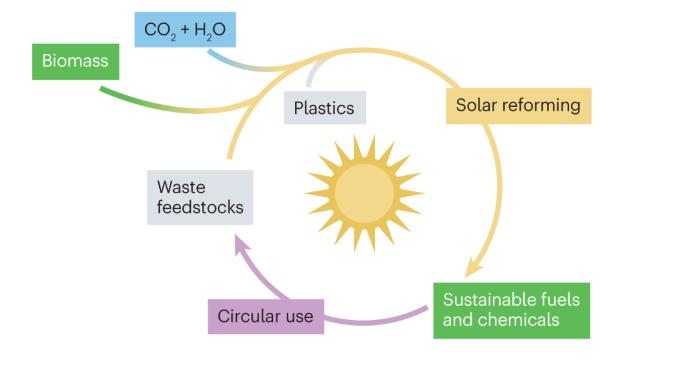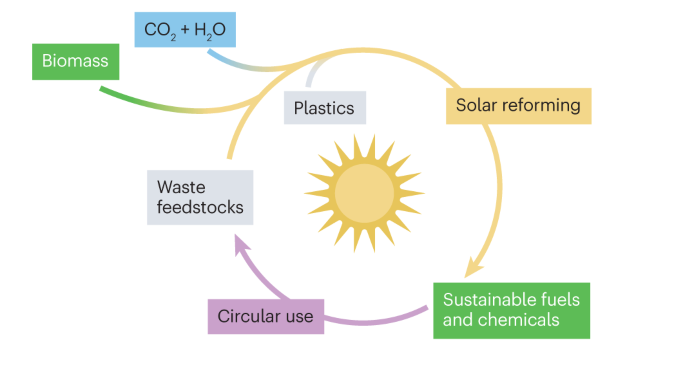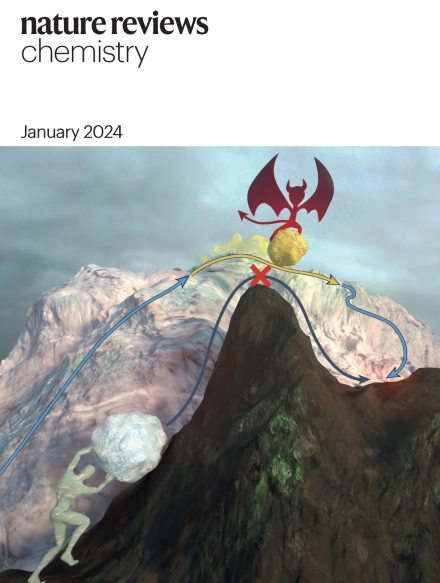Solar reforming as an emerging technology for circular chemical industries
IF 38.1
1区 化学
Q1 CHEMISTRY, MULTIDISCIPLINARY
引用次数: 0
Abstract
The adverse environmental impacts of greenhouse gas emissions and persistent waste accumulation are driving the demand for sustainable approaches to clean-energy production and waste recycling. By coupling the thermodynamically favourable oxidation of waste-derived organic carbon streams with fuel-forming reduction reactions suitable for producing clean hydrogen or converting CO2 to fuels, solar reforming simultaneously valorizes waste and generates useful chemical products. With appropriate light harvesting, catalyst design, device configurations and waste pre-treatment strategies, a range of sustainable fuels and value-added chemicals can already be selectively produced from diverse waste feedstocks, including biomass and plastics, demonstrating the potential of solar-powered upcycling plants. This Review highlights solar reforming as an emerging technology that is currently transitioning from fundamental research towards practical application. We investigate the chemistry and compatibility of waste pre-treatment, introduce process classifications, explore the mechanisms of different solar reforming technologies, and suggest appropriate concepts, metrics and pathways for various deployment scenarios in a net-zero-carbon future. This Review introduces solar reforming as an emerging technology to produce sustainable fuels and chemicals from diverse waste feedstocks using sunlight. The chemistry and concept of solar reforming, suggestions of key metrics and proposed directions to realize solar-powered refineries for a future circular economy are discussed.


太阳能重整作为循环化学工业的新兴技术。
温室气体排放和废物长期积累对环境造成的不利影响,推动了对清洁能源生产和废物回收利用可持续方法的需求。通过将废物衍生有机碳流的热力学有利氧化与适合生产清洁氢气或将二氧化碳转化为燃料的燃料形成还原反应相结合,太阳能重整同时实现了废物的价值化和有用化学产品的生成。通过适当的光收集、催化剂设计、装置配置和废物预处理策略,一系列可持续燃料和高附加值化学品已经可以从生物质和塑料等不同的废物原料中选择性地生产出来,展示了太阳能驱动的升级再循环工厂的潜力。本综述重点介绍了太阳能重整这一新兴技术,该技术目前正从基础研究向实际应用过渡。我们研究了废物预处理的化学性和兼容性,介绍了工艺分类,探讨了不同太阳能重整技术的机理,并针对净零碳未来的各种部署方案提出了适当的概念、衡量标准和途径。
本文章由计算机程序翻译,如有差异,请以英文原文为准。
求助全文
约1分钟内获得全文
求助全文
来源期刊

Nature reviews. Chemistry
Chemical Engineering-General Chemical Engineering
CiteScore
52.80
自引率
0.80%
发文量
88
期刊介绍:
Nature Reviews Chemistry is an online-only journal that publishes Reviews, Perspectives, and Comments on various disciplines within chemistry. The Reviews aim to offer balanced and objective analyses of selected topics, providing clear descriptions of relevant scientific literature. The content is designed to be accessible to recent graduates in any chemistry-related discipline while also offering insights for principal investigators and industry-based research scientists. Additionally, Reviews should provide the authors' perspectives on future directions and opinions regarding the major challenges faced by researchers in the field.
 求助内容:
求助内容: 应助结果提醒方式:
应助结果提醒方式:


